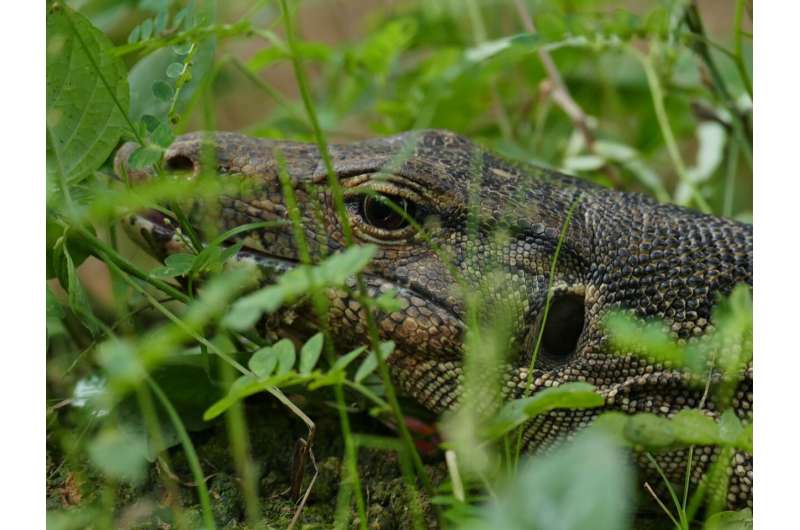October 12, 2021 report
Monitor lizards in Borneo found to prefer forests next to oil palm plantations

A team of researchers from Cardiff University working with staff at the Danau Girang Field Centre in Sabah, Malaysia, has found that monitor lizards living in the Malaysian part of Borneo prefer to reside in the natural forests that abut oil plantations, rather than in the plantations themselves. They have published a paper describing their findings on the open-access site PLOS ONE.
Prior research has shown that Asian water monitor lizards do well in areas where oil palm plantations replace the native plants and trees. At times, their numbers grow higher than in their native surroundings because of the abundant food supply courtesy of tree leftovers and the rodents that feed on them. The researchers with this new effort were puzzled when they found that the monitor lizards living in the Lower Kinabatangan Wildlife Sanctuary seemed to prefer living in the forests next to the plantations, rather than in them.
The sanctuary outlines the path taken by the Kinabatangan River and in addition to the monitors, is home to exotic species such as Bornean elephants, orangutans and proboscis monkeys. To learn more about the monitors, the researchers set traps and captured 400 specimens, each of which was weighed and measured and tagged with a tracking chip. After three years of studying the movements of the lizards, the researchers found that they clearly preferred living in the forests that surrounded the oil palm plantations. They mostly traveled to the plantations when they wanted an easy meal. They also found that the monitors were thriving—their numbers were higher than in places where there are no oil palm plantations—and some were bigger than those in natural habitats. The researchers suggest the high numbers of lizards could also be explained by the scarcity of Sunda clouded leopards, a competitor for food.
Speculating about why the lizards preferred the nearby forest, the researchers suggest it is likely because they provide better breeding grounds by giving shelter for hatchlings (almost all of the younger lizards lived exclusively in the forest). They also suggest the tree cover helps keep eggs cooler.
More information: Sergio Guerrero-Sanchez et al, The critical role of natural forest as refugium for generalist species in oil palm-dominated landscapes, PLOS ONE (2021). DOI: 10.1371/journal.pone.0257814
Journal information: PLoS ONE
© 2021 Science X Network





















